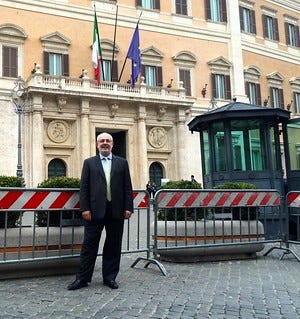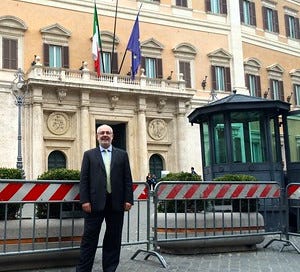The euro, my part in its downfall
I once had lunch with Italian anti-euro nationalists. They had invited me because I was in Rome to give evidence on cryptocurrency to a committee in the Italian Parliament and they wanted to ask me about parallel and complementary currencies (yes, really). Here I am in from of the Italian Parliament building, Montecitorio, for the public hearing.

(The nice people at Cashless Way made a photo album of the day for you if you want to see more.)
My host for this day was Geronimo Emili (below) from the “War on Cash”. I won’t go into the discussions — they have been covered elsewhere (e.g., here) — but I focused my contribution on the radical and innovative nature of the Bitcoin protocol while remaining sceptical about the potential for Bitcoin as a currency (although I did support the idea that new kinds of currency are around the corner). I think the past four years have reinforced my summary comments to the hearing, which were broadly that Bitcoin is a genuine technological breakthrough and it will cause a revolution, but probably not in payments.

After that, it was off to lunch with (if memory serves) the Deputy Leader of one of the political parties that was in favour of more autonomy for the North. We had a very interesting conversation - through a translator - about the potential for new technology to make regional and city currencies a practical possibility. I’m rather in favour of having more currencies and particularly more currencies that are more closely linked to the values and needs of communities. There is a general argument in favour of a regional approach to currencies in a mobile-phone powered always-on digital age. I first heard it clearly expressed by the late Sir Richard Body MP. Sir Richard was a noted eurosceptic, supporter of an English parliament and, rather famously, one of the “bastards” referenced by John Major. He was also very interested in the theory and practice of money and at the second annual Consult Hyperion Forum (back in 1999) he gave an eloquent explanation as to why regional currencies with floating exchange rates would lead to more efficient resource allocation and more beneficial resource distribution than government transfer payments do.
I think I may have mentioned this at lunch.
Although I thought no more about it at the time, it looks as if I may have inadvertently conspired to destroy the euro, as I now read that the anti-euro Lega nationalists and the alt-Left Five Star Movement are planning to go around the euro and create a rival payment structure based on ‘IOU’ notes. This would subvert the monetary control of the European Central Bank and might well set off a chain reaction in Catalonia, Scotland and perhaps even London.
Oh well.




